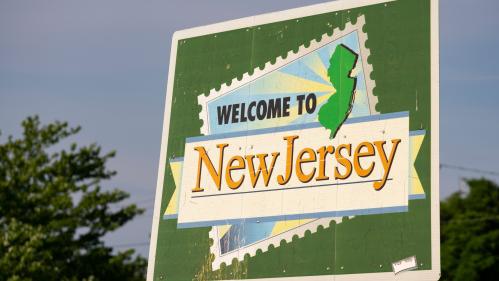Outlook on New Jersey Is Stagnant as Quality of Life Falls Slightly

Rutgers-Eagleton Poll shows little movement on ratings for senate candidates; 2025 gubernatorial hopefuls remain largely unknown
It might be a new year, but not a whole lot has changed when it comes to New Jerseyans’ views of their state and politicians, according to the latest Rutgers-Eagleton Poll.
New Jerseyans’ outlook on the state has changed little in the past six months, continuing to trend more negative than positive. Forty-three percent say the state is headed in the right direction, while 47 percent say it is on the wrong track; 11 percent are unsure.
While not a sizeable shift, residents’ ratings of New Jersey as a whole have taken a few-point hit. Slightly more than half say the Garden State is an “excellent” (12 percent) or “good” (40 percent) place to live – a small downturn for each from when last measured in 2022. Thirty-two percent rate life in New Jersey as “only fair” and another 15 percent as “poor,” up slightly from two years ago.
“New Jerseyans’ outlook on the state continues to be divided in these polarizing times, and positive views on quality of life here are at their lowest point in over a decade,” said Ashley Koning, an assistant research professor and director of the Eagleton Center for Public Interest Polling (ECPIP) at Rutgers University–New Brunswick. “Partisanship significantly colors perceptions of both the state’s present and future, as it does most issues these days, with Democrats in a much more optimistic mindset than either Independents or Republicans.”
When it comes to the 2024 Senate primary in New Jersey, large majorities continue to not know or have an opinion on two of Sen. Bob Menendez’s challengers, U.S. Representative Andy Kim and New Jersey First Lady Tammy Murphy.
Two-thirds are either unaware (45 percent) or unsure (23 percent) of Kim, down a few points from November 2023. While the number of those unfavorable toward Kim has stayed virtually the same (10 percent), his favorability has climbed to 23 percent (up 6 points). More New Jerseyans have taken sides on Murphy: 6 in 10 say they are unaware (38 percent) or unsure (24 percent) of her, compared with 7 in 10 last November. Both favorable and unfavorable impressions of Murphy have increased in just a couple of months, with now 18 percent viewing her favorably (up 5 points) and 20 percent viewing her unfavorably (up 6 points). These same patterns hold up among those who say they are registered to vote.
While Kim and Murphy each garner about the same numbers from Democrats, Kim has an edge with Independents – 23 percent favorable versus 12 percent favorable for Murphy.
“Both Andy Kim and Tammy Murphy still have a long way to go in terms of name recognition, and they only have less than five months to do it,” said Koning. “If there is any real difference in public opinion on these two candidates right now, Kim has had slightly more positive movement in his numbers compared to Murphy among the small number of those who provided an opinion, but the verdict is still out on each of them for the vast majority of New Jerseyans.”
Menendez’s ratings continue to suffer in the wake of multiple federal indictments. Nine percent of New Jerseyans have a favorable impression of Menendez (up 3 points since November 2023), compared with 60 percent who have an unfavorable one. Fifteen percent of all New Jerseyans have no opinion, and 16 percent are unaware of who Menendez is.
Negativity toward the senator spans across all demographics, including all partisans. Democrats, however, are slightly more favorable than their counterparts at 13 percent. These latest numbers for Menendez precede the most recent superseding indictment in his case.
“Sen. Menendez’s initial nosedive in favorability from November continues in these latest numbers,” said Koning. “His favorability continues to trail both Andy Kim’s and Tammy Murphy’s, and while his challengers need to gain ground in terms of name recognition, Menendez has the much harder task of reversing the negativity surrounding him if he decides to stay in the race.”
Gov. Phil Murphy garners the same favorability rating as he did in November – 46 percent – but the number of those who have an unfavorable impression of him has now crept back up to 34 percent (up 6 points). Sixteen percent say they have no opinion on the governor, and four percent claim to not know who he is.
Those vying to become Murphy’s predecessor in 2025 are mostly unknown by New Jerseyans. On the Democratic side, two-thirds of New Jerseyans either don’t know (39 percent) or have no opinion (27 percent) on former State Senate President Steve Sweeney; the rest are divided on Sweeney, with 15 percent having a favorable impression of him, compared with 19 percent with an unfavorable one. Even fewer are aware of Jersey City Mayor Steve Fulop, with 1 in 5 taking sides on the gubernatorial hopeful (11 percent favorable, 8 percent unfavorable) and 8 in 10 either saying they don’t know him (57 percent) or have no opinion of him (25 percent).
On the Republican side, the presumptive candidates don’t fare much better. Two-thirds remain unaware of (39 percent) or undecided on (26 percent) former Republican gubernatorial candidate Jack Ciattarelli; 19 percent are favorable toward him while 16 percent are unfavorable. Nearly 9 in 10 either don’t know (66 percent) or are unsure (20 percent) of State Sen. Jon Bramnick; 8 percent have a favorable opinion of him, and 6 percent an unfavorable one.
Numbers among registered voters for all four of these political figures are essentially the same.
“Despite their prominent roles in New Jersey politics, Bramnick, Ciattarelli, Fulop, and Sweeney are mostly unknown to New Jerseyans,” said Jessica Roman, a research associate at ECPIP. “And we still have to go through multiple other elections until the 2025 gubernatorial begins to heat up and voters start paying attention.”
Results are from a statewide poll of 1,657 adults contacted through multiple modes, including by live interviewer on landline and cell phone, MMS text invitation to web, and the probability-based Rutgers-Eagleton/SSRS Garden State Panel from Dec. 13 to Dec. 23. The full sample has a margin of error of +/- 2.8 percentage points. The registered voter subsample contains 1,451 registered voters and has a margin of error of +/- 3.0 percentage points.




